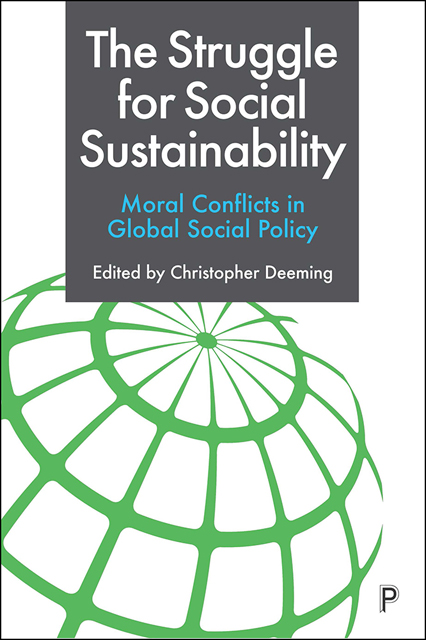Book contents
- Frontmatter
- Contents
- List of boxes, figures and tables
- List of abbreviations
- Notes on contributors
- Acknowledgements
- Preface
- 1 The ‘social’ in the age of sustainability
- 2 ‘No such thing as society’? Neoliberalism and the social
- 3 The social question: reconciling social and economic imperatives in policy
- 4 Disputing the economization and the de- politicization of ‘social’ investment in global social policy
- 5 The social dimension of sustainable development at the UN: from Brundtland to the SDGs
- 6 Paradigm lost? Blocking the path to ecosocial welfare and post- productivism
- 7 World population prospects at the UN: our numbers are not our problem?
- 8 Ageing sustainably
- 9 The political challenges to governing global migration and social welfare
- 10 Bringing in ‘the social’: an intersectional analysis of global crises and welfare
- 11 Global social policy and the quasi- concept of social cohesion
- 12 Putting the global in social justice?
- 13 ‘Go- social’? Inclusive growth and global social governance
- 14 For better or worse?
- 15 The struggle for social sustainability
- Index
6 - Paradigm lost? Blocking the path to ecosocial welfare and post- productivism
Published online by Cambridge University Press: 14 April 2023
- Frontmatter
- Contents
- List of boxes, figures and tables
- List of abbreviations
- Notes on contributors
- Acknowledgements
- Preface
- 1 The ‘social’ in the age of sustainability
- 2 ‘No such thing as society’? Neoliberalism and the social
- 3 The social question: reconciling social and economic imperatives in policy
- 4 Disputing the economization and the de- politicization of ‘social’ investment in global social policy
- 5 The social dimension of sustainable development at the UN: from Brundtland to the SDGs
- 6 Paradigm lost? Blocking the path to ecosocial welfare and post- productivism
- 7 World population prospects at the UN: our numbers are not our problem?
- 8 Ageing sustainably
- 9 The political challenges to governing global migration and social welfare
- 10 Bringing in ‘the social’: an intersectional analysis of global crises and welfare
- 11 Global social policy and the quasi- concept of social cohesion
- 12 Putting the global in social justice?
- 13 ‘Go- social’? Inclusive growth and global social governance
- 14 For better or worse?
- 15 The struggle for social sustainability
- Index
Summary
Introduction
Having been bricked deeply into the masonry of modern societies, no discussion of how to redesign the architecture of economy, society and natural environment can sensibly proceed without extensive reference to social policies. Inevitably, there will be disagreements about what this entails. Yet can we at least agree on some broad categories to focus debate?
This chapter begins by defining an ecosocial agenda and presents post-productivism as one instance of this. Though the former is deliberately broad-spectrum, what it denotes – the development of synergies across social and environmental policies – has barely registered to date (Fitzpatrick, 2017). Being comprehensive, it also contains some familiar divisions: between those who favour remaining close to existing socioeconomic models and those for whom environmentalism and the ecosocial implies a greater, transformative potential. ‘Post-productivism’ belongs to the latter tendency.
Two key challenges, or blockades, are outlined. The first deals with process. Several scenarios for the future of the labour market are outlined, one of which involves ‘employment-centred welfare’ and one is termed the ‘part-time labour market’. The second challenge concerns the contemporary context. What should we do about a capitalism that has wreaked havoc on democracy?
The ecosocial and post-productivism
‘Ecosocial policy’ possesses at least three features (Fitzpatrick, 2014, 2017: 232–40; see also Koch and Fritz, 2014).
Firstly, a recognition that social and environmental policies must converge across three domains: (1) research and scholarship, (2) government legislation, policy making and institutional reorganization, at local, national and international levels, (3) the practices and ethos of relevant agents (professionals, practitioners, service users, activists and so on).
Secondly, such convergence involves a search for creative synergies which enable multiple strategies to be pursued and multiple goals to be realized. For instance, energy-efficient buildings emit less CO2, especially when powered through renewable sources, and reduced consumption benefits poorer households especially since their energy costs are proportionately high (Fitzpatrick, 2014: ch 6). Such synergies also imply reconsideration of some big questions regarding the proper functions of and relationship between (a) public and private sectors, (b) states, markets and civic spaces.
Finally, the above would depend upon and make a vital contribution to a new social politics of the 21st century. This needs to be more equal, so that the benefits and burdens of sustainability can be shared out fairly. It needs to be more participative and democratic.
- Type
- Chapter
- Information
- The Struggle for Social SustainabilityMoral Conflicts in Global Social Policy, pp. 109 - 128Publisher: Bristol University PressPrint publication year: 2021



